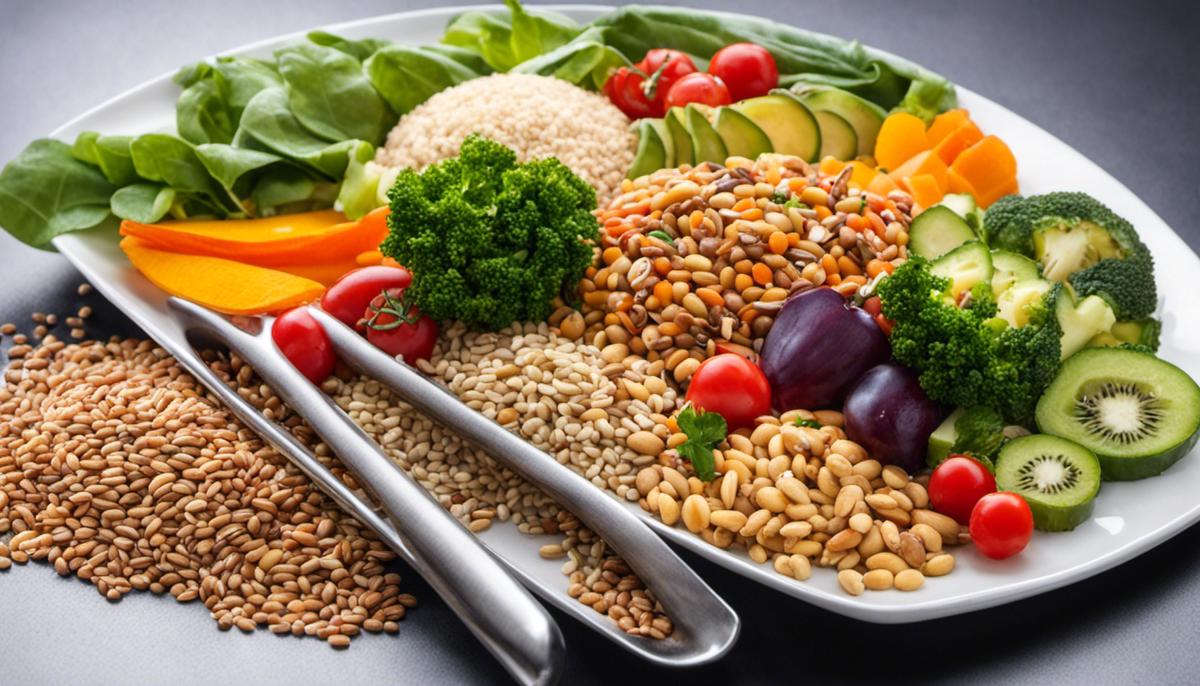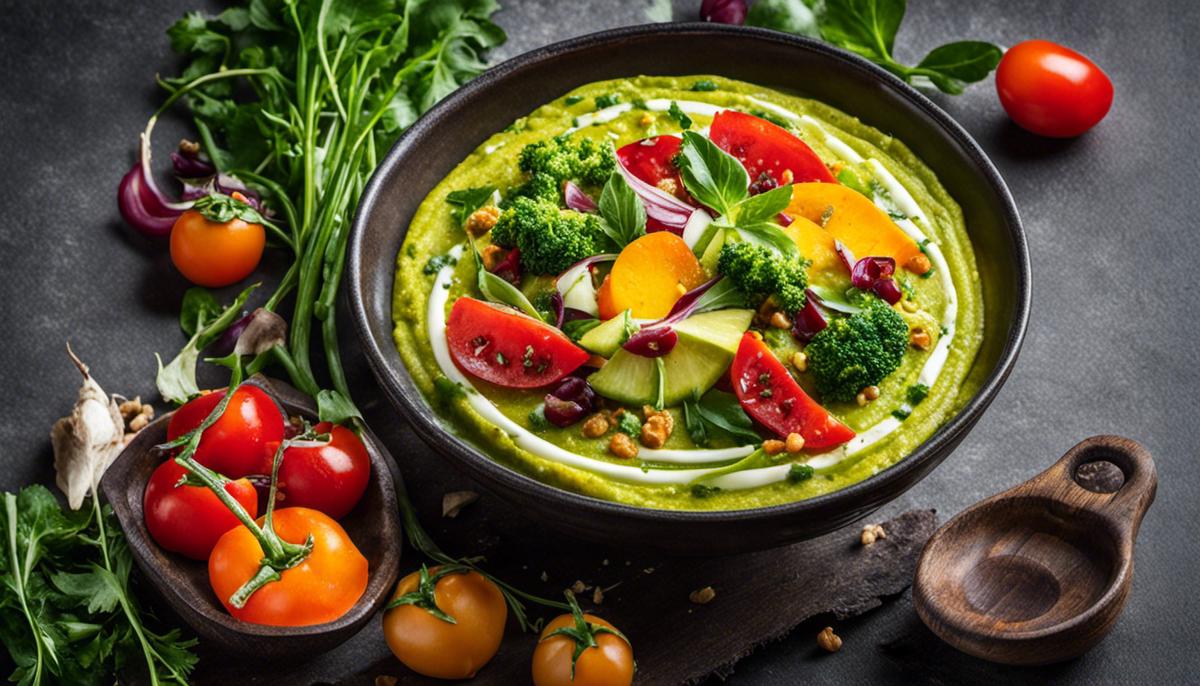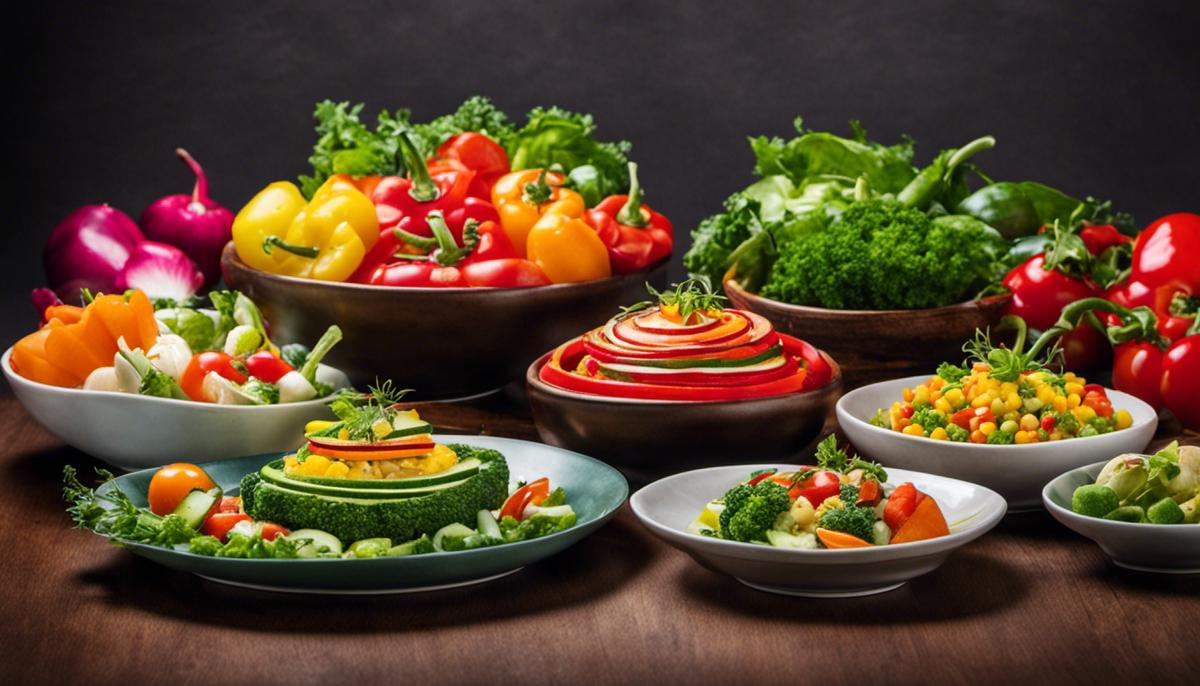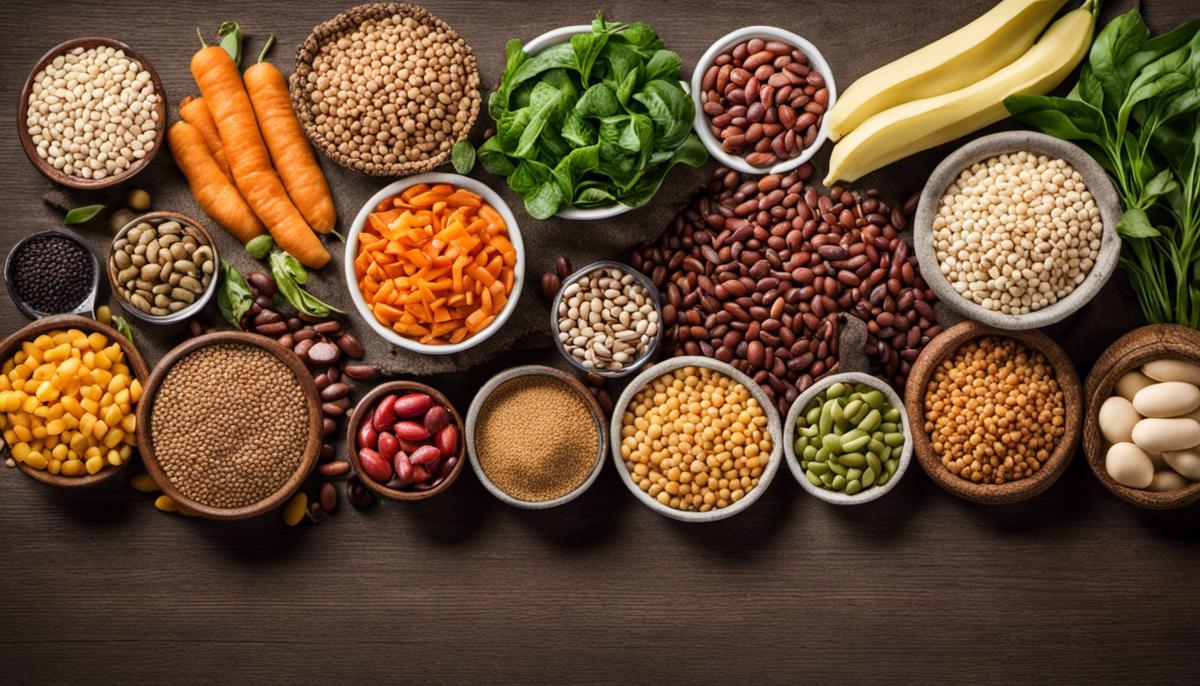Stepping into the lush, nutrient-rich world of vegetarianism often begins with the question: What will I eat for an entire week? The adoption of a plant-based diet presents an exciting and flavorful journey, filled with an array of nourishing options that support a balanced lifestyle. This exploration extends from the nuts and bolts of maintaining a well-rounded vegetarian diet, to culinary adventures of various cuisines, and engaging the whole family in this lifestyle adjustment. Through this transition, you not only assume responsibility for your wellbeing but also contribute to a healthier planet, and it need not be monotonous or taxing.
Table of Contents
Basics of a Vegetarian Diet
Nourishing the Family With a Balanced Vegetarian Diet
Feeding a family can be challenging, especially when juggling work, school schedules, and everything in between. Deciding to adopt a vegetarian lifestyle for the family may seem like another added complication. However, a balanced vegetarian diet can provide all the essential nutrients the family needs, and it can be delicious too!
An understanding of what constitutes a nutritionally solid vegetarian diet helps in meal planning and shopping. The building blocks for a balanced vegetarian diet are divided into six main categories: grains, vegetables, fruits, legumes, nuts and seeds, and dairy or dairy alternatives. These categories provide essential nutrients that contribute to a healthy diet.
Starting with grains, these nutrition powerhouses are an excellent source of carbohydrates, which provide the energy your family needs to keep going throughout the day. Whole grains such as brown rice, oats, and whole wheat bread are preferred as they are rich in fiber and help maintain a healthy weight and reduce the risk of heart disease.
Vegetables and fruits are essential components of a vegetarian diet. They are naturally low in fat and calories and are packed with multiple nutrients, including potassium, dietary fiber, and vitamins A and C. Experts recommend a colorful variety of fruits and vegetables daily, as each offers unique nutritional benefits.
Legumes are some of the vegetarian diet superheroes. These include all types of beans, lentils, and peas, which are great sources of protein, fiber, and iron. They are a staple in vegetarian recipes and are integral in replacing the meat in dishes.
A vegetarian diet wouldn’t be complete without the power of nuts and seeds. They are heart-healthy and however small, these nutrition nuggets are packed with protein, fiber, and essential fats. They make tasty snacks and can be used to add flavor and crunch to salads or desserts.
Dairy products or their alternatives are the primary source of calcium in a vegetarian diet. Calcium is essential for strong bones and teeth. While dairy is a common source, there are plenty of lactose-free or vegan alternatives like almond milk, coconut milk, or tofu, to ensure everyone in the family gets their daily calcium dose.
Additional supplements like vitamin B12, vitamin D, and omega-3 fatty acids are often recommended, as they can be tougher to gain from plant sources alone. Consulting a healthcare provider or nutritionist can provide clarity on the specific needs of each family member and the right ways to fulfill those.
Well, now we’ve managed to decode the secrets to a balanced vegetarian diet. Every meal can be a colorful, nutritious experience, brimming with endless variations. Encourage dialogue about food with the family, engaging everyone in meal planning and preparation, making the vegetarian journey an adventurous bond-building activity. Here’s to happy, healthy, and veggie-full eating! With these foundations, a thriving, well-nourished, vegetarian family lifestyle is possible. Imagine the satisfaction of putting out a dinner plate full of healthy, colorful, and vibrant foods that each member of the family will enjoy.

Meal Planning 101
Steering Through the Busy Life: A Game Plan for Nutritious, Vegetarian Family Meals
When we’re all caught up in the hustle-bustle of life and juggling a multitude of things from chauffeuring kids to soccer practice to managing the household finances, meal planning can sometimes take a backseat. Many busy parents might wonder, “How can I plan a nutritious, vegetarian meal every day for my family?” Well, fret not! With a little forethought and organization, you can ensure your family is eating wholesome and delicious meals.
First things first, we need to acknowledge that vegetarian meal planning isn’t a chore, it’s actually a wonderful opportunity! Planning meals ahead has so many advantages; it saves time, reduces food waste, and eases the nightly scramble. It’s quite exciting to plan a new recipe or twist a traditional one into something more fun and fresh.
Let’s start by mapping out the week. You don’t need to elaborate on every single meal of the day. Rather, focus on the main meal, such as dinner. Make room in your schedule, say Sunday afternoon, where you can give your meal planning some dedicated time. Isn’t it comforting to ask that age-old question “What’s for dinner tonight?” and actually have a well-thought-out answer?
Go-to recipes are a lifesaver in this busy life. Reach out for those tried and tested vegetarian recipes that your family loves. Consider organizing these in a recipe binder or a digital pinboard for easy access. Include a good mix of lentil soups, stir-fried vegetables, grain salads, pasta, and plenty of other recipes you can whip up in a snap.
How about leftovers? Instead of viewing them as boring repeats, let’s rebrand them as a time-saving trick. Imagine cooking a big pot of chickpea curry on Monday night and spinning those leftovers into veggie-stuffed burritos for Tuesday’s lunch! Leftovers can creatively be reused, making meal prepping even more efficient.
Getting children involved can turn meal planning into a fun family activity. Give them ownership over a meal. You’d be amazed at the ideas they come up with! This not only empowers them but creates an environment where they can learn about nutrition and healthy eating habits firsthand.
Lastly, consider meal prep. Prepping your veggies, grains, or legume dishes in advance can make dinnertime a breeze. Keep things like cooked quinoa or brown rice, chopped or blanched veggies, or pre-cooked beans in your fridge. This way, you have versatile ingredients ready and can throw together a nutritious meal in no time.
Don’t forget to keep stocking the fridge and pantry with nutrient-rich staples like tofu, tempeh, diverse beans, a spectrum of fruits and veggies, wholesome grains, nuts, and dairy or dairy alternatives. This not only opens up an array of meal possibilities but also ensures you always have healthy options on hand.
Remember, meal planning isn’t about perfection. It’s about finding what works best for you and your family. It’s about nurturing your family with goodness, one meal at a time. Embrace the chaos, stay flexible, and above all, enjoy the process! Happy meal planning!
Easy and Delicious Vegetarian Recipes
Families nowadays need delicious, simple, and nutritious meal ideas that don’t take a great deal of time or effort. Being a vegetarian family doesn’t mean that meals have to be dull. So bearing this thought in mind, here is a compilation of some wholesome and palatable vegetarian family recipes:
- Hearty Vegetable Stir-Fry: Chop up whatever veggies are in the fridge – bell peppers, broccoli, zucchini, or carrots work great. Sauté these in a little olive oil with garlic, ginger, and tamari for a quick, nutritious meal. Serve over brown rice or quinoa for added protein and whole grain benefits.
- Black Bean and Veggie Tacos: Taco night can easily accommodate vegetarians. Sauté black beans with onions, bell peppers, zucchini and sweet corn. Spice up with chili powder, paprika, and cumin. Serve in warm tortillas with cheese, avocado, and fresh salsa.
- Pasta Primavera: This is a simple pasta dish incorporating fresh vegetables in a light sauce. Ideal ingredients include asparagus, bell peppers, zucchini, and cherry tomatoes. Toss veggies with cooked pasta in a lemon-garlic sauce and top with a sprinkling of parmesan.
- Buddha Bowls: These are an adaptable way to combine grains, veggies, and proteins in one bowl. Start with a base of rice or quinoa, add roasted veggies of choice, legumes such as chickpeas, topped with a creamy tahini dressing.
- Chickpea Curry: For families who like an exotic flavor, this is a great protein-rich option. Chickpeas, tomatoes, onions, with a blend of spices like cumin, coriander, and turmeric create a simple yet flavorful curry. Serve it over rice with a side of naan.
- Veggie Pizza: Pizza is always a family-favorite and is incredibly versatile. Opt for a whole wheat crust, tomato sauce, cheese, and load with preferred veggies. Bake until crisp and enjoy every slice.
- Vegetarian Shepherd’s Pie: This comfort food classic is best for cozy family dinners. Substituting lentils for ground meat and topping with creamy mashed potatoes makes for a delightful vegetarian version.
- Bean and Cheese Burritos: Roll up a soft tortilla with refried beans, cheese, rice, and salsa for a healthy kid-friendly meal that can be prepared in advance.
- Pumpkin and Spinach Lasagna: This recipe is a gorgeous blend of creamy, tangy, and sweet flavors with nutritious benefits from spinach, pumpkin, and ricotta cheese.
- Ratatouille: A traditional French dish packed with eggplant, zucchini, bell peppers, served over whole-grain couscous modifies into a full meal.
The benefits of these recipes are they are flexible permitting replacement of any ingredient mentioned with any other vegetable of your family’s preference. Remember, it’s not just about preparing a meal, but also about having fun and involving everyone in the process. Bon Appétit!

Preparing and Educating the Family
Exploring New Vegetarian Recipes as a Family
Switching to the no-meat life can be an exciting yet daunting change for the family, but it can also serve as an excellent opportunity for fostering creativity and enhancing the family bond. Exploring new vegetarian recipes can turn out to be a fantastic learning and bonding activity.
Family cooking sessions can, indeed, serve as delectable learning laboratories. Each new recipe tried allows younger members to strengthen fundamental math skills through measuring ingredients, hone their reading ability via recipe instructions, and understand science concepts as they see how combining ingredients can result in a delicious, healthful meal. In addition, older kids and teenagers can learn essential life skills, including food shopping, meal preparation, proper cleanup, safe food handling, and even budgeting.
Coming up with diverse vegetarian recipes that cater to distinct dietary preferences also becomes an opportunity for open and thoughtful discussions, thus refining communication skills. From whipping up the quirkiest smoothies to creating the most colorful salads, every family member gets to pitch in their personal taste prefereces and unique culinary findings, leading to an atmosphere that fosters love, unity, and mutual respect.
Trying out global vegetarian cuisines is another fun and enlightening course to take. Delve into the sumptuous world of Indian vegetarian curries, explore the rich flavors of Mexican bean and vegetable dishes, or savor the simplicity and health benefits of Japanese vegetarian meals. This approach exposes the family to various cultures worldwide, broadening their perspectives and cultivating a sense of appreciation for diversity.
On each day of the week, a different member of the family can pick a recipe, not only giving them a chance to exercise decision-making, but also instilling accountability for the meal’s success. This could also prove to be a fun competition of sorts- whose dish turned out best!
Growing your own vegetables can likewise enrich transition to a vegetarian lifestyle. It offers numerous benefits, from supplementing your family’s food supply to providing a stress-relieving hobby. Gardening with your family can cultivate an appreciation for nature and a better understanding of where food originates. It can also teach patience and responsibility to the younger ones.
Changes in the family’s dietary lifestyle should not only be limited to the kitchen. It opens doors for continuously educating all members about making conscientious health decisions and engaging in the up-to-date realities of global food sustainability. Building a library of age-appropriate books and documentaries about being vegetarian helps initiate intellectually-stimulating conversations about respect for living things, food wastage, and nutrition ethics.
With all these in mind, it’s clear that the move to a vegetarian lifestyle isn’t just about food, but it’s about life learning experiences, imparted values, appreciation for global culture, nature, and revelling in the warm fun-filled time you spend as a family. It is a beautiful expedition, making hearty memories and instilling core principles that the young ones would carry into their adulthood.

Ultimately, embracing a vegetarian lifestyle provides a multitude of benefits – from contributing to personal health and wellness to promoting sustainability. By incorporating a diverse array of plant-based foods, beans, legumes, and whole grains, each vegetarian meal becomes a celebration of nutrients. Coupled with thoughtful planning and preparation, every breakfast, lunch, and dinner can emerge as an exciting culinary masterpiece in its own right. Whether you are rediscovering classics in their vegetarian avatar, or inviting your family to partake in meal preparation, remember that this journey is filled with exploration, learning, and a whole lot of deliciousness. So here’s to a healthier, greener lifestyle, one scrumptious vegetarian meal at a time.

Elena Vasquez is a certified nutritionist and seasoned food writer, blending scientific knowledge with a passion for healthful, flavorful cuisine. With a degree in Nutritional Sciences and a professional culinary background, Elena offers a unique perspective on the intersection of food and well-being. Her articles serve up a healthy dose of evidence-based dietary advice and culinary tips, inspiring readers to embrace a balanced and vibrant lifestyle.

